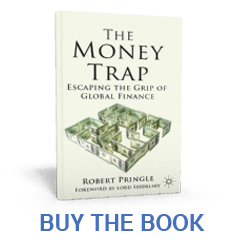Governments’ failure to manage the global financial crisis is having profound political and geo-political consequences – all of them adverse. Fuelled by political desperation to boost demand, national monetary policies are becoming steadily more aggressive – not so much “beggar my neighbour” as “sauve qui peut”. Financial repression is ongoing. As we all know, once governments resort to controls, they usually remain in force much longer than originally intended. Meanwhile, five years of austerity and no end in sight is fuelling nationalist political movements. Increased hostility between China and its neighbours, especially Japan, is fuelled by economic tensions. Smaller countries are at the mercy of events they cannot influence.
The most ominous geo-political effects so far have been in Europe – the crisis in the eurozone and now a backlash against the EU in Britain.
In a recent by-election the UK Independence Party, which is pledged to withdraw from the EU, came second, gaining 24% of the vote and humiliating the mainstream parties. The prime minister, David Cameron, has promised a referendum in 2017.
So the Britsh show all the symptoms of another attack of their euro neurosis, for which a course of psychiatric treatment would be the best remedy. It bores everybody else to tears. Never mind, here we go again!
The latest bout started with the death and funeral of Lady Thatcher. This was used by the media to remind everybody of her defiance of the call by the then president of the European Commission, Jacques Delors, for the European Parliament to be the democratic body of the community, the commission to be the executive and the Council of Ministers to be the senate. The video of her saying “No. No. No,” to the House Commons on 30 October 1990 has been endlessly repeated. (Few remembered that In 1975 she played a key role in campaigning for the UK to remain in the European Community. Or that 1978 she was arguing for a common European approach to defence. Or that she also criticised the then Labour government for failing to sign up to the exchange-rate mechanism).
This got the Brits in the right mood for another bout of euro-bashing.
I am sad to see Lord Lawson, who was chancellor of the exchequer under Lady Thatcher, stir things up. The argument he advanced in The Times yesterday has three parts. First, the EU has fulfilled its historic mission of containing Germany and so is not needed. Second, the EU’s main objective, driven by the needs of the euro area, has become that of building a federal European superstate – an effort which he sees as “profoundly misguided” and in any case “certainly not for us”. Thirdly, the economic benefits of leaving would “substantially`’ outweigh the costs – notably the cost of EU regulation of finance, which he views as a threat to the City.
I happen to disagree with Lawson on all this but the point I wish to make is different. It distracts the British from the real issues.
Such an argument would not have gained traction if the UK and the EU had recovered from the crisis – or showed a realistic prospect of doing so. It is the failure to exit from the money trap that is behind all this growing international strife.
Yet we can recover only if we have the correct diagnosis.
It is true that the euro area governments and to some extent the ECB share the blame for this. Lawson is right to criticise their inward-looking attitudes. But the same criticism applies to the UK, the US, Japan, China and the rest! Instead of identifying and correctly analysing the real issues facing us politicians and even some central bankers blame others.
To imply that if only the UK were free of the shackles of the EU, it would prosper on its own is a dangerous illusion.
Lord Lawson has been doing sterling work as a member of the Parliamentary Commission on banking standards. It is a shame that he has not used his influence to urge other reforms badly needed by the UK and the world economy. The debate abut Britain and Europe is a complete distraction from what really matters to people on both sides of the Channel.

